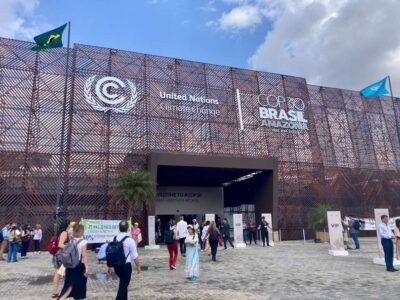Why Paris won’t be Copenhagen
Christiana Figueres, head of the UN climate convention, makes the argument at UCLA
As Executive Secretary of the UN Framework Convention on Climate Change since 2010, Christiana Figueres jokes that it has been her job to “put 195 countries in a better mood” after the overhyped Copenhagen talks in 2009. The Emmett Institute hosted a lunch at UCLA with Ms. Figueres earlier this week, in which she assured California stakeholders that this year’s Paris conference, though in some ways similarly hyped, will be different. In Paris, as in Copenhagen, countries will be trying to create a new agreement, housed under the Framework Convention, to reduce global greenhouse gases and to reduce harms from climate change. Here’s why the efforts will end better this time, in her view.
- Climate impacts around the globe are more obvious, and much more troubling, than they were in 2009, heightening motivation and urgency;
- Renewable energy sources are much cheaper than they were in 2009, making the path to energy system transitions much clearer;
- More generally, the possibility of “decoupling” our economic growth from the growth of GHGs is much better demonstrated now than it had been in 2009 (Ms. Figueres notes that last year was the first to show global economic growth without global GHG growth); and
- Many more jurisdictions around the world have already embraced meaningful climate reduction policies than they had in 2009.
Ms. Figueres didn’t say this explicitly, but it’s clear that the goodwill she has generated among countries over the last few years, along with her sheer willpower as the talks proceed, will also be factors. (If you have ever doubted the role that personal diplomacy and forceful individuals can play behind the scenes at these UNFCCC conferences, read Science as a Contact Sport by the late, great Stephen Schneider. His tales of the intersection of politics and science at these meetings are fascinating.) At this stage in the process, Ms. Figueres is not admitting the possibility of defeat–she assures us we will get an agreement. In her words, “We could get an agreement tomorrow, if necessary.” She says she is refusing to consider any other outcome.
But what about the content of the agreement? Is the UN sacrificing stringency and efficacy in the name of consensus? Yes, no doubt. Ms. Figueres admits that the substance of the recent G7 statement calling for a decarbonization of the global economy by 2100 was watered down in order to achieve agreement. But she nevertheless defended the G7 statement as critically important for communicating a firm and stable direction for policy. Paris will see the same dynamic, and no one should be surprised when the aggregate of commitments coming out of Paris are found not to be sufficient to keep us to 2 degrees of warming, Ms. Figueres stressed. In her view, the most important thing is for leaders to point the ship in the right direction. Once policy shows we are committed to transitioning to a zero-carbon economy, innovators and market players will come on board and the transformation will gain momentum.
Picking up on another climate change theme this week, “From her lips to God’s ears.”
Reader Comments
3 Replies to “Why Paris won’t be Copenhagen”
Comments are closed.







Cara said;
“……. Once policy shows we are committed to transitioning to a zero-carbon economy, innovators and market players will come on board………..”
Dear Cara,
It is easy for mere humans to talk about transitioning to zero-carbon but it is much more difficult to actually do anything that would effectively accomplish this transition. So difficult in fact that one should not to worry about transitioning, it is better to just continue living as we have. A zero-carbon society is unworkable because it diminishes quality of life and increases human suffering.
The upcoming UN convention on climate change in Paris is already a flop and yet another big and extravagant waste of time and taxpayer’s money.
Global HOP growth has appeared to “decouple” from GHG growth for at least 2 four to six-year periods since 1980. Each time, GAP and GHG growth came into realignment again. I think it is important to ask and tall about why that is true, and not to make too big a deal over another year of apparent decoupling.
Cara, the greatest fact of life in California today is that UC professors and scholars must accept primary responsibility for producing and implementing solutions with the greatest sense of urgency. We must also act as a role model for the world.
Our politicians have failed to act on the challenges of change that are threatening our civilization, so our intellectuals are our last resort to make the right things happen before time runs out, especially now that we have passed 400 ppm CO2 with no end in sight.